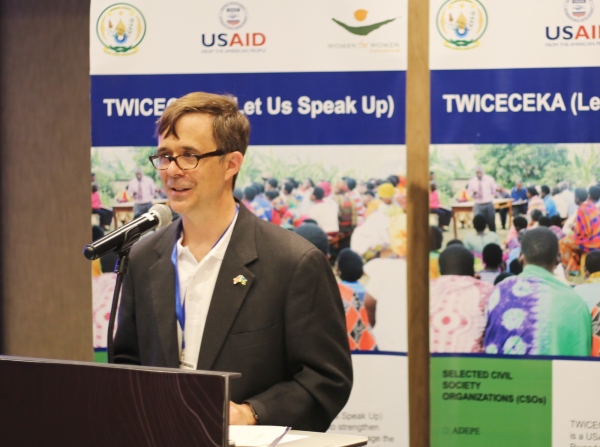
The United States Agency for International Development (USAID), officially celebrated the closing of “TWICECEKA” (Let Us Speak Up), a project which was implemented by Women for Women International (WfWI), and aimed to strengthen Rwandan civil society organizations’ (CSOs) ability to engage the government to address and prevent Gender-Based Violence (GBV) issues.
The one-day Lessons Learned Conference brought together representatives from CSOs, relevant government institutions, USAID representatives, community stakeholders, and other international donors to discuss the experience of WfWI and the CSOs they supported as a result of the Twiceceka project.
The learning event was held virtually, hosted by Antoinette Uwimana, Executive Director of Women for Women-Rwanda, and was attended by Assumpta Ingabire, Permanent Secretary of the Ministry of Gender and Family Promotion; Ambassador Peter H. Vrooman, U.S. Ambassador to Rwanda; and Debra Bowers, Deputy Vice President of Global Programs at Women for Women International, among other notable attendees.
The discussion included a presentation of Twiceceka’s achievements and sustainability; lessons learned and challenges; and key recommendations for future GBV programming in Rwanda, especially for the Mission’s long-term investments in GBV prevention and response.
At the beginning of the project, eight CSOs working on GBV prevention and response were selected to work with WfWI to implement the project in eight districts. Each CSO received training to build their capacity and other technical assistance to further aid them in the implementation.
Through the Twiceceka project, more than 800 people received GBV services (e.g., health, legal,
psycho-social counseling, shelters, hotlines, and others), more than 860 people were trained in women’s rights and GBV prevention, and more than 350,000 community members were engaged in GBV awareness and prevention through CSO-led community activities. The project also supported 395 teen mothers with technical and vocational skills, financial literacy, entrepreneurship, business development and management training.
USAID is the foreign assistance agency of the United States Government. USAID supports $129 million of development assistance annually to Rwanda, with programs in health, economic development, education, and democracy and governance. (End)
